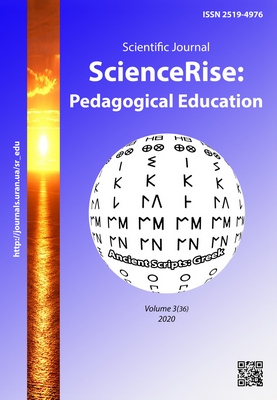The content of primary school teachers’ training in the context of providing information and communication technologies into the inclusive educational environment
DOI:
https://doi.org/10.15587/2519-4984.2020.200524Keywords:
informatization, inclusive educational environment, electronic educational resources, competence, preparation of future teachersAbstract
The features of preparing future primary school teachers to work with a computer as a means of managing information as well as one on global computer networks, and mastering digital competencies to design and apply informational technologies that underpin electronic educational resources are analyzed in the article.
The basic directions of improvement of preparation of future primary school teachers for the usage of informational and communicational technologies in professional activity in the conditions of inclusive educational environment are considered and substantiated.
The purpose of the article is analysis of the status and substantiation of the directions of preparation of future teachers, regarding the peculiarities and possibilities of using informational and communicational technologies in the inclusive primary school educational environment.
At the same time, the peculiarities of the functioning of the informational-educational inclusive environment, which provides informational interaction between users (educators, specialists, parents, students, etc.) are characterized.
The program of the educational discipline "Informational technologies in inclusive education of children with complications of processes of development and socialization" is offered.
It is proved, that the offered methodical principles and directions of improvement of the content of preparation of future teachers for the usage of informational technologies in professional activity in the conditions of inclusive educational environment provide for certain practically oriented organization of work. Implementation of a training program, within a specially organized course is focused on improving the knowledge and skills in the usage of these technologies in professional activities in an inclusive environment. Therefore, a teacher in the information society as a skilled specialist of intellectual work, with a high level of education, becomes the main resource for improving its quality, which will contribute to the formation of demotivation indicators among participants in the educational process of labor migration
References
- Demchenko, I. I. (2016). Teoretychni i metodychni zasady pidhotovky maibutnoho vchytelia pochatkovykh klasiv do profesiinoi diialnosti v umovakh inkliuzyvnoi osvity. Uman, 716.
- Myronova, S. P. (2016). Realii ta perspektyvy zabezpechennia inkliuzyvnoi osvity fakhivtsiamy. Naukovyi chasopys Natsionalnoho pedahohichnoho universytetu imeni M. P. Drahomanova. Seriia 19: Korektsiina pedahohika ta spetsialna psykholohiia, 32 (2), 5–10.
- Sharma, M. (2016). Innovative roles of guidance and counseling for managing children with learning disabilities in inclusive classroom by inclusive teachers. International Journal of Research in Social Sciences, 6 (12). Available at: https://www.academia.edu/35974967/Innovative_Roles_of_Guidance_and_Counseling_for_Managing_Children_with_Learning_Disabilities_in_Inclusive_Classroom_by_Inclusive_Teachers
- Leniv, Z. (2018). Formuvannia profesiinoi hotovnosti fakhivtsia do roboty v inkliuzyvnomu osvitnomu prostori pochatkovoi shkoly. Obrii, 2 (47), 57–61
- Kachurovska, O. B. (2014). Do problemy vykorystannia informatsiino-komunikatsiinykh tekhnolohii v navchanni ditei z osoblyvymy osvitnimy potrebamy. Naukovyi chasopys Natsionalnoho pedahohichnoho universytetu imeni M. P. Drahomanova. Seriia 19: Korektsiina pedahohika ta spetsialna psykholohiia, 27, 71–75. Available at: http://nbuv.gov.ua/UJRN/Nchnpu_019_2014_27_17
- Shevtsiv, Z. M. (2017). Profesiina pidhotovka maibutnikh uchyteliv pochatkovoi shkoly do roboty v inkliuzyvnomu seredovyshchi zahalnoosvitnoho navchalnoho zakladu. Kyiv: «Tsentr uchbovoi literatury», 384.
- Zaporozhchenko, Yu. H. (2013). Vykorystannia zasobiv IKT dlia pidvyshchennia yakosti inkliuzyvnoi osvity. Informatsiini tekhnolohii v osviti, 15, 138–145. Available at: http://nbuv.gov.ua/UJRN/itvo_2013_15_17
- Chupakhina, S.; Babych, M. M. (Ed.) (2019). Methodological bases for digital competence formation of future teachers under conditions of inclusive education: Ukrainian content. Modern World tendencies in the development of science: monograph. Vol. 2. London: Sciemcee Publishing, 26–40.
- Fedorenko, I. V. (2012). Cuchasni pidkhody do vykorystannia kompiuternykh tekhnolohii u navchalnomu protsesi uchniv zriznymy porushenniamy psykhofizychnoho rozvytku. Zbirnyk naukovykh prats Kamianets-Podilskoho natsionalnoho universytetu imeni Ivana Ohiienka. Seriia: Sotsialno-pedahohichna, 19 (1), 268–274. Available at: http://nbuv.gov.ua/UJRN/znpkp_sp_2012_19(1)__31
- Sofii, N. Z. (2017). Orhanizatsiino-pedahohichni umovy intehrovanoho suprovodu uchniv z osoblyvymy osvitnimy potrebamy v inkliuzyvnomu navchalnomu zakladi. Kyiv, 23.
Downloads
Published
How to Cite
Issue
Section
License
Copyright (c) 2020 Svitlana Chupakhina

This work is licensed under a Creative Commons Attribution 4.0 International License.
Our journal abides by the Creative Commons CC BY copyright rights and permissions for open access journals.
Authors, who are published in this journal, agree to the following conditions:
1. The authors reserve the right to authorship of the work and pass the first publication right of this work to the journal under the terms of a Creative Commons CC BY, which allows others to freely distribute the published research with the obligatory reference to the authors of the original work and the first publication of the work in this journal.
2. The authors have the right to conclude separate supplement agreements that relate to non-exclusive work distribution in the form in which it has been published by the journal (for example, to upload the work to the online storage of the journal or publish it as part of a monograph), provided that the reference to the first publication of the work in this journal is included.







